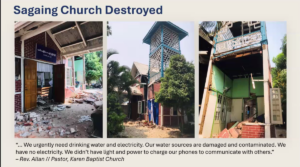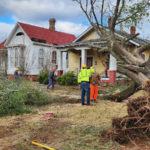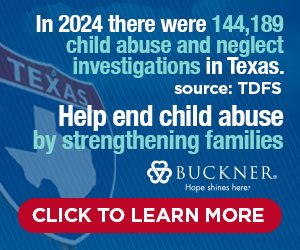The 19 million people already displaced by violence and persecution in Myanmar have been joined by another 8 million internally displaced individuals since a deadly earthquake struck on March 28, Baptist World Aid Director Marsha Scipio said.
Of the 25 Baptist churches in cities most affected by the earthquake, 15 church buildings were destroyed and the remaining 10 received significant damage, Scipio said.
Many of those churches housed people who already were displaced, Scipio added. More than 100 people sought refuge in the sanctuary of Kachin Baptist Church in Mandalay until its top floor collapsed, she said. Those individuals now are sleeping on the ground outside the church building.
 She quoted the pastor of Karen Baptist Church in Sagaing, one of the churches destroyed by the earthquake, as saying: “We urgently need drinking water and electricity. Our water sources are damaged and contaminated. We have no electricity. We didn’t have light and power to charge our phones to communicate with one another.”
She quoted the pastor of Karen Baptist Church in Sagaing, one of the churches destroyed by the earthquake, as saying: “We urgently need drinking water and electricity. Our water sources are damaged and contaminated. We have no electricity. We didn’t have light and power to charge our phones to communicate with one another.”
The earthquake killed more than 3,000 people—including at least one Baptist pastor—and injured at least 4,500 others, she noted.
Suffering compounded
Scipio presented an update on the Baptist response in Myanmar and other areas in need as part of a Baptist World Alliance Global Impact Church online briefing April 3.
The earthquake—and the 11 military airstrikes on vulnerable areas that followed, until the government agreed to a temporary ceasefire on April 2—compounded suffering in a country already in dire straits, she reported.
The “severe and swift reduction” in U.S. Agency for International Development funding already was creating challenges among BWA partners, such as a Baptist convention that ministers at a camp on the Myanmar/Thailand border housing more than 30,000 refugees, Scipio said.
“Baptist World Aid has received over $250,000 in requests from our Baptist partners working along the border and inside Myanmar, for everything from food supplies to solar panels to provide power to water pumps to bring clean water into the camps,” she said.
Sign up for our weekly edition and get all our headlines in your inbox on Thursdays
Identifying priority needs
Baptists within the country are responding to their neighbors in need, Scipio said.
Churches in the Myanmar Baptist Convention collected an offering in response and has a disaster relief committee assessing needs. The Kachin Baptist Convention has delivered food and provided emergency medical assistance.
 In consultation with Baptists in Myanmar, Baptist World Aid and its global partners identified emergency food distribution and temporary shelter as priority needs.
In consultation with Baptists in Myanmar, Baptist World Aid and its global partners identified emergency food distribution and temporary shelter as priority needs.
Specifically, Baptist World Aid hopes to provide $625,000 to supply emergency food kits Baptists can distribute to families at 25 church-based distribution centers and $465,000 for temporary shelter packages with blankets, mats, mosquito nets and cooking utensils for 5,000 families, Scipio said.
Hungarian Baptist Aid will send two team members to Myanmar to help guide the disaster response, she added.
Scipio also reported:
—In the eastern Democratic Republic of Congo, 1.2 million people have been displaced since the beginning of the year. Many of the Congolese Baptist churches have been “on the front lines,” offering shelter and meals to displaced people and serving victims of violence, she said.
Last month, Baptist World Aid sent $10,000 to Baptists in the DRC for food distribution and—with the help of another Baptist partner—sent another $30,000 last week, Scipio said. However, she added, another $33,000 still is needed to continue serving for the next month.
—In South Sudan—which recently experienced an upsurge of displaced people—USAID funding cuts are expected to affect 7.9 million people.
As NGOs that previously received aid from the United States have to lay off local workers, thousands of people in South Sudan will be left without jobs, Scipio said.
Last month, the Baptist World Alliance surveyed its global partner organizations to discover the anticipated impact of USAID cuts.
Key findings included:
- Tens of thousands of people are affected.
- Funding cuts mean the cessation of critical aid to internally displaced people and refugees.
- Partner groups are experiencing job losses and staff dismissals.
- Vulnerable people lose access to essential services, including health care, sanitation and clean water supplies.
- A resurgence of diseases and increased mortality rates are expected.
- Children, youth, the elderly and people with disabilities grow increasingly vulnerable.
- Organizations are struggling to maintain operations and are forced to reduce the scope and scale of their programs.
Both Scipio and BWA General Secretary Elijah Brown encouraged Baptists globally to “Stand in the Gap” to meet needs at a time of “rapid deceleration of government-supported humanitarian assistance” around the world.
Churches cannot replace all the funds that have been cut, but Baptists “cannot sit on the sidelines” when people are suffering, Brown said.
As part of the Stand in the Gap emphasis, Brown and Scipio urged Baptist churches to take an offering to help Baptists globally respond to people in need, either on the fifth Sunday of an upcoming month or another appropriate time.
















We seek to connect God’s story and God’s people around the world. To learn more about God’s story, click here.
Send comments and feedback to Eric Black, our editor. For comments to be published, please specify “letter to the editor.” Maximum length for publication is 300 words.